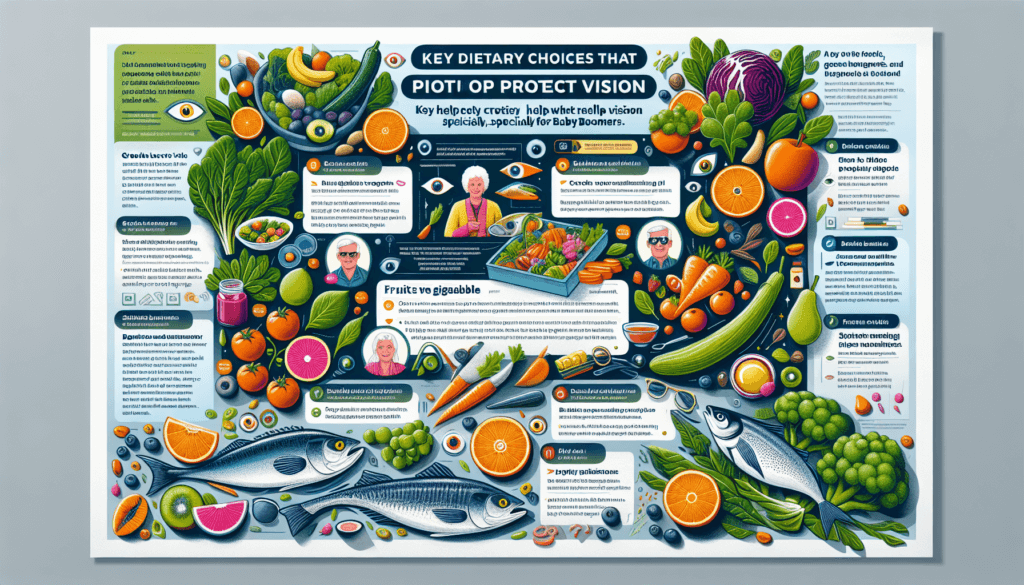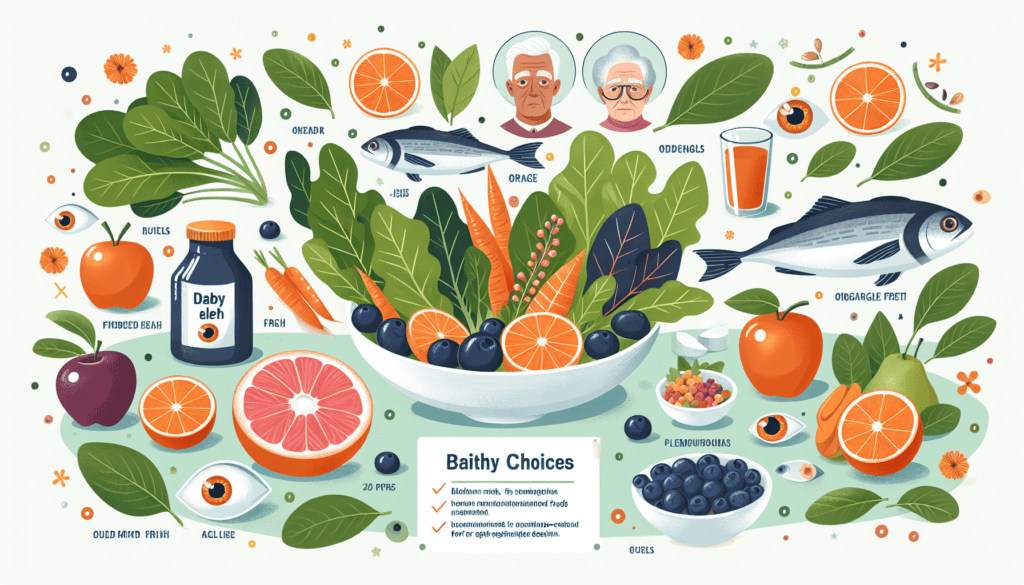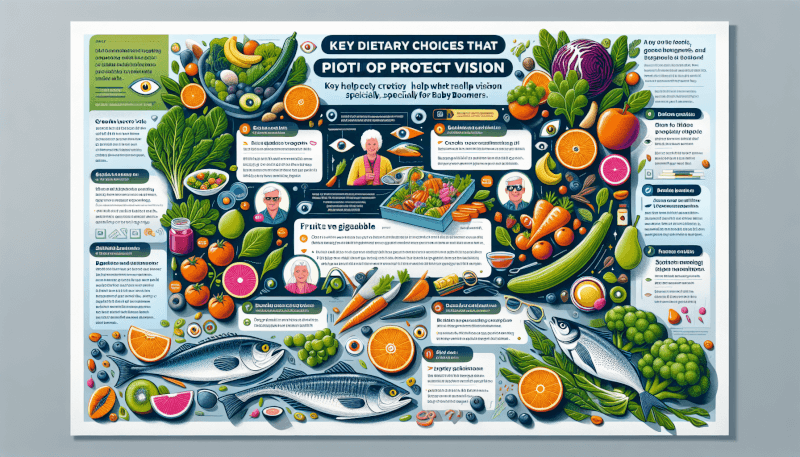As a boomer, taking care of your vision becomes increasingly important with age. Fortunately, there are steps you can take to reduce the risk of age-related vision problems through your diet. By incorporating specific nutrients such as lutein, zeaxanthin, omega-3 fatty acids, vitamin C, vitamin E, and zinc into your meals, you can support your eye health and potentially ward off issues like cataracts and macular degeneration. Additionally, maintaining a healthy weight, managing blood sugar levels, and avoiding smoking can also contribute to protecting your eyesight. With a few simple dietary changes, you can prioritize your vision and enjoy clear, vibrant eyes for years to come.

Importance of Diet for Vision Health
As you age, maintaining good vision health becomes increasingly important. Age-related vision problems such as cataracts, age-related macular degeneration (AMD), and glaucoma are common concerns for many older adults. While genetics and other factors play a role in these conditions, research has shown that diet can significantly impact your eye health and reduce the risk of developing these vision problems. By incorporating a variety of nutrient-rich foods into your diet, you can support your vision and ensure healthy eyes for years to come.
The Effects of Aging on Vision Health
As you age, your eyes undergo various changes that can affect your vision. The most common age-related vision problems include cataracts, AMD, and glaucoma. Cataracts occur when the lens of your eye becomes cloudy, impairing your vision. AMD, on the other hand, affects the macula, which is responsible for central vision, making it difficult to see fine details. Glaucoma is a group of eye conditions that damage the optic nerve, leading to vision loss. These conditions can significantly impact your quality of life, making it crucial to prioritize your eye health as you age.

Role of Diet in Maintaining Eye Health
A well-balanced diet that includes a variety of nutrients is essential for maintaining good vision health throughout your life. Certain nutrients play a crucial role in supporting optimal eye function, protecting against oxidative stress, and reducing the risk of age-related vision problems. By incorporating these nutrients into your diet, you can nourish your eyes and improve their overall health.
Nutrients that Support Vision Health
Several nutrients have been identified as particularly beneficial for eye health. These nutrients include vitamin A, vitamin C, vitamin E, zinc, and omega-3 fatty acids. Let’s explore each of these nutrients in more detail.

Vitamin A
Vitamin A is a key nutrient for maintaining good vision. It helps protect the surface of your eyes and supports overall eye health. Vitamin A is also essential for normal functioning of the retina, which is responsible for converting light into nerve signals that allow you to see. Foods rich in vitamin A include carrots, sweet potatoes, spinach, kale, and apricots. Including these foods in your diet can help ensure you’re getting adequate amounts of vitamin A to support your vision.
Vitamin C
Vitamin C is a powerful antioxidant that helps protect your eyes from oxidative stress. It plays a crucial role in maintaining the health of blood vessels in your eyes, which is essential for good vision. Foods rich in vitamin C include oranges, strawberries, bell peppers, broccoli, and papaya. By incorporating these foods into your diet, you can provide your eyes with the necessary vitamin C they need to stay healthy.

Vitamin E
Vitamin E is another potent antioxidant that helps protect the cells in your eyes from damage caused by free radicals. It plays a key role in supporting eye health and reducing the risk of age-related vision problems. Foods rich in vitamin E include almonds, sunflower seeds, avocado, spinach, and butternut squash. By including these foods in your diet, you can ensure you’re getting enough vitamin E to promote optimal eye health.
Zinc
Zinc is an essential mineral that plays a crucial role in maintaining good eye health. It helps transport vitamin A from the liver to the retina, where it is used to produce melanin, a protective pigment in the eyes. Zinc also supports the function of enzymes that protect against oxidative damage. Foods rich in zinc include beef, beans, pumpkin seeds, oysters, and yogurt. Adding these foods to your diet can help ensure you’re getting sufficient amounts of zinc to support your vision.

Omega-3 Fatty Acids
Omega-3 fatty acids are a type of healthy fat that helps reduce inflammation throughout the body, including the eyes. They also support optimal visual development and function. Foods rich in omega-3 fatty acids include salmon, mackerel, sardines, flaxseeds, and chia seeds. Including these foods in your diet can provide your eyes with the omega-3 fatty acids they need for optimal health.
Other Eye-Healthy Foods to Include
In addition to the key nutrients mentioned above, there are several other foods that offer significant benefits for eye health. These include leafy green vegetables, eggs, citrus fruits, berries, and nuts and seeds. Leafy green vegetables like kale and spinach are rich in antioxidants that help protect your eyes from damage. Eggs contain nutrients like lutein and zeaxanthin, which are essential for maintaining good vision. Citrus fruits like oranges and berries are high in vitamin C, which supports healthy blood vessels in the eyes. Nuts and seeds offer a variety of eye-healthy nutrients, including vitamin E, zinc, and omega-3 fatty acids.
The Role of Antioxidants
Antioxidants play a crucial role in protecting your eyes from oxidative stress and reducing the risk of age-related vision problems. Oxidative stress occurs when there is an imbalance between free radicals and antioxidants in the body, leading to cell damage. By consuming foods rich in antioxidants, you can help counteract oxidative stress and promote optimal eye health.
How Antioxidants Protect Vision
Antioxidants neutralize harmful free radicals, which are unstable molecules that can damage cells in your eyes. This damage can lead to various vision problems and increase the risk of age-related conditions. By consuming foods rich in antioxidants, you provide your eyes with the necessary protection against oxidative stress, reducing the risk of developing vision problems as you age.
Foods Rich in Antioxidants
Foods rich in antioxidants include fruits, vegetables, nuts, and seeds. Brightly colored fruits and vegetables, such as berries, spinach, and sweet potatoes, are particularly high in antioxidants. Nuts and seeds, such as almonds and sunflower seeds, also contain significant amounts of antioxidants. By incorporating these foods into your diet, you can support your vision health and protect your eyes from oxidative stress.
Conclusion
Maintaining good vision health is crucial as you age, and diet plays a significant role in achieving this goal. By incorporating a variety of nutrient-rich foods into your diet, particularly those high in vitamin A, vitamin C, vitamin E, zinc, and omega-3 fatty acids, you can support your vision and reduce the risk of age-related vision problems. Additionally, consuming foods rich in antioxidants can help protect your eyes from oxidative stress and maintain optimal eye health. Take care of your eyes by prioritizing your diet and enjoying a wide range of eye-healthy foods.


